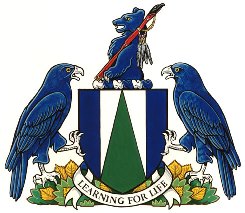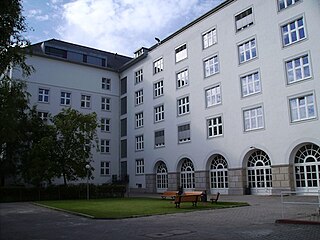
The University of Alberta is a public research university located in Edmonton, Alberta, Canada. It was founded in 1908 by Alexander Cameron Rutherford, the first premier of Alberta, and Henry Marshall Tory, the university's first president. It was enabled through the Post-secondary Learning Act. The university is considered a "comprehensive academic and research university" (CARU), which means that it offers a range of academic and professional programs that generally lead to undergraduate and graduate level credentials. It is ranked among the top public universities in Canada by major college and university rankings.

Athabasca University (AU) is a Canadian public research university that primarily operates through online distance education. Founded in 1970, it is one of four comprehensive academic and research universities in Alberta, and was the first Canadian university to specialize in distance education.
The Faculty of Information (or the iSchool at the University of Toronto) is an undergraduate and graduate school that offers the following programs: a Bachelor of Information (BI), a Master of Information (MI), a Master of Museum Studies (MMSt), and a PhD in information studies, as well as diploma courses. As a member of the iSchool movement, the Faculty of Information takes an interdisciplinary approach to information studies, building on its traditional strengths in library and information science, complemented by research and teaching in archives, museum studies, user experience, information systems and design, critical information studies, culture and technology, knowledge management, digital humanities, the history of books, data science and other related fields. It is located on St. George Campus, in the Claude Bissell building, at 140 St. George Street, which is attached to the John P. Robarts Research Library and the Thomas Fisher Rare Book Library.
The UCLA School of Education and Information Studies is one of the academic and professional schools at the University of California, Los Angeles. Located in Los Angeles, California, the school combines two departments. Established in 1881, the school is the oldest unit at UCLA, having been founded as a normal school prior to the establishment of the university. It was incorporated into the University of California in 1919.

The King's University located in Edmonton, Alberta, Canada, is a Canadian Christian university offering bachelor's degrees in the arts, humanities, music, social sciences, natural sciences, business, and education. King's is one of 26 publicly funded post-secondary institutions in Alberta. The University serves more than 900 students from across Canada and abroad, representing more than 16 nations.
The Master of Library and Information Science (MLIS), also referred to as the Master of Library and Information Studies, is the master's degree that is required for most professional librarian positions in the United States. The MLIS is a relatively recent degree; an older and still common degree designation for librarians to acquire is the Master of Library Science (MLS), or Master of Science in Library Science (MSLS) degree. According to the American Library Association (ALA), "The master’s degree in library and information studies is frequently referred to as the MLS; however, ALA-accredited degrees have various names such as Master of Information Studies, Master of Arts, Master of Librarianship, Master of Library and Information Studies, or Master of Science. The degree name is determined by the program. The [ALA] Committee for Accreditation evaluates programs based on their adherence to the Standards for Accreditation of Master's Programs in Library and Information Studies, not based on the name of the degree."
The Hamburg University of Technology is a research university in Germany. The university was founded in 1978 and in 1982/83 lecturing followed. Around 100 senior lecturers/professors and 1,475 members of staff work at the TUHH.
KIMEP University is a private university founded in 1992 in Almaty, Kazakhstan.
The Alberta School of Business, University of Alberta is located in Edmonton, Alberta, Canada. Founded in 1916, it is a research-intensive publicly funded institution and is consistently ranked in the top 50 publicly funded universities for research by the Financial Times of London.

The School of Library and Information Studies of the University of the Philippines or UP SLIS is the oldest library school in the Philippines. Formally established in March 1961 as the Institute of Library Science, it can trace it roots to 1914, making it one of the first library schools in Asia. It is an independent degree-granting unit of the University of the Philippines Diliman, and offers programs in the field of library and information science. In December 2015, the Commission on Higher Education declared the school as the first and only Center of Excellence among universities and colleges with library and information programs in the Philippines.
Education for librarianship, including for paraprofessional library workers, varies around the world, and has changed over time. In recent decades, many institutions offering librarianship education have changed their names to reflect the shift from print media to electronic media, and to information contained outside of traditional libraries. Some call themselves schools of library and information science, or have dropped the word "library" altogether.

The Information School at the University of Washington is an undergraduate and graduate school that offers BS, MLIS, MS, MA, and PhD degrees. Formerly the Graduate School of Library and Information Sciences (GSLIS), the Information School changed its focus and name in the late 1990s.

The Berlin School of Economics and Law, abbreviated as BSEL, is a public institution of higher education and research founded on 1 April 2009 through the merger of the Berlin School of Economics (BSE) and the FHVR Berlin. The BSEL portfolio provides a wide range of Bachelor's and Master's programmes in fields such as business, administration for the public and private sector, public security, law, or engineering. BSEL has an international approach with close working relationships to over 150 partner universities all over the world.
The College of Information Studies is a school within the University of Maryland, College Park in Maryland, United States. The College offers graduate study leading to the Master of Library and Information Science (MLIS), the Master of Information Management (MIM), the Master of Science in Human Computer Interaction (HCIM), and the Doctor of Philosophy (Ph.D.) in Information Studies. In addition, it offers an undergraduate degree, the Bachelor of Science in Information Science. The College of Information Studies focuses on creating new designs and addressing issues involving Information Management.

Nazarbayev University (NU) is an autonomous research university in Astana, Kazakhstan. It was founded by former President of Kazakhstan-Nursultan Nazarbayev- in June 2010, it is an English-medium institution, with an international faculty and staff.

UBC School of Information is a graduate school at the University of British Columbia in Vancouver offering a Master of Archival Studies (MAS), a Master of Arts in Children's Literature (MACL), a Master of Library and Information Studies (MLIS), a DUAL Master of Archival Studies/Master of Library and Information Studies (MASLIS) and a Doctor of Philosophy in Library, Archival and Information Studies (Ph.D.). Founded in 1961 as the School of Librarianship, the iSchool is currently located in the Irving K. Barber Learning Centre. The school changed its name in 2018, but was previously known as the School of Library, Archival and Information Studies. UBC iSchool is an internationally ranked, multi-disciplinary school, ranked first in the world for graduate education in library and information management based on 2019 and 2020 QS ranking.
The University of Arizona School of Information is a multidisciplinary academic department and professional school that is housed within the university's College of Social and Behavioral Sciences. The school focuses on the many aspects of information organization, management, or use and its impact on individuals and society. A combination of the School of Information Resources & Library Science (SIRLS) and the School of Information: Science, Technology, and Arts (SISTA), this new department plays host to faculty and students engaged in research and education on facets of the information sciences.

The Faculty of Information and Media Studies (FIMS) is a faculty at University of Western Ontario, located in London, Ontario, Canada. The faculty offers programs at the undergraduate and graduate levels focusing on the advancement of knowledge in media, communications, and information technologies.

Located in London, Ontario, Canada, the Library and Information Science (LIS) program at the University of Western Ontario offers both Masters and PhD level programs through the Faculty of Information and Media Studies (FIMS). Its Master of Library and Information Science (MLIS) program is one of seven Canadian MLIS programs currently accredited by the American Library Association (ALA). Both the PhD and Masters programs in Library and Information Sciences at Western FIMS emphasize research skills development, engagement with professional literature, information technology learning, and professional career preparedness.









